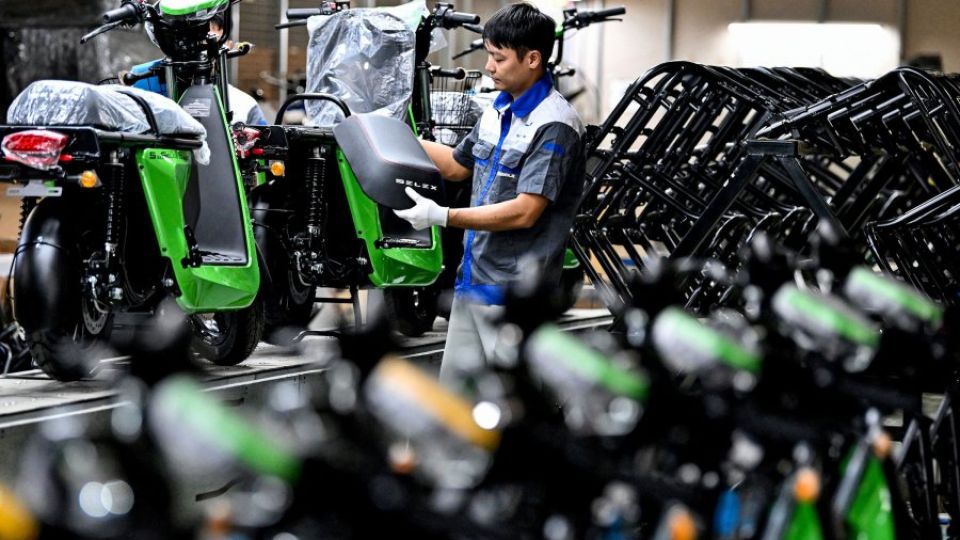January 3, 2025
HANOI – Việt Nam has the potential to become a manufacturing hub in the region this year, especially in fields involving technology, as global companies have expressed interest in expanding operations in the country.
Foreign direct investment (FDI) into Việt Nam reached nearly US$31.4 billion in the first 11 months of 2024, with disbursed FDI estimated at about $21.7 billion, an increase of 7.1 per cent compared to the same period in 2023. The year 2024 was the third consecutive year that the country disbursed over $20 billion in FDI.
Việt Nam is among the top 15 developing countries attracting the most FDI globally.
The northern province of Bắc Ninh led the country with total registered investment capital of nearly $5.04 billion, accounting for 16 per cent of the total national investment capital, more than three times higher than the same period in 2023.
The coastal province of Quảng Ninh ranked second with $2.29 billion of registered capital, followed by HCM City with $2.28 billion, then Hải Phòng, Hà Nội and Bình Dương.
Among the 110 countries and territories investing in Việt Nam in the first 11 months, Singapore led with a total investment capital of nearly $9.14 billion, accounting for over 29 per cent of the total investment, a 53.7 per cent increase compared to the same period in 2023.
FDI trends for 2025
Investments into high-value sectors like electronics, semiconductors and green technology led the amount of FDI into Việt Nam in 2024, and will likely continue to do so this year.
Recently, the Government and leading American chipmaker NVIDIA signed an agreement to establish the Vietnam Research and Development Centre and Artificial Intelligence (AI) Data Centre in Việt Nam. This is a historic milestone for the country, preparing it to become the leading AI research and development hub in Asia and the third globally, after the US and Taiwan (China).
From April 1 this year, Singapore-based Google Asia Pacific Pte. Ltd. will transfer the rights and obligations of its advertising partners in Việt Nam to Google Vietnam Company Limited, based in HCM City, marking its first official operations in Việt Nam.
During a meeting with Party General Secretary Tô Lâm in New York on September 25, 2024, SpaceX’s senior vice president for global business and government affairs Tim Hughes revealed that the American spacecraft provider planned to invest $1.5 billion in Việt Nam. The Trump Organization said it will invest a similar amount in Hưng Yên Province.
In November, Foxconn, an electronics supplier for Apple, announced an $80 million investment in chip manufacturing in Bắc Giang Province, where Mark Zuckerberg’s Meta also plans to expand its virtual reality equipment production.
Instead of only attracting investment in assembly operations as in previous years, Việt Nam is quickly becoming an important part of the global technology world. This trend is becoming clearer with the potential for significant policy changes under the upcoming presidency of Donald Trump, which could accelerate the shift of production to Việt Nam.
The country may experience more sustainable and faster growth, which will lessen its dependence on the real estate sector.
Caution with ‘origin evasion’ investments
While acknowledging the benefits of rising FDI, economic experts also stressed the need for caution regarding FDI flows from China, as the US-China trade war is resuming.
Although China ranks third in terms of registered capital in Việt Nam, it has the highest number of newly licensed projects, accounting for 28.3 per cent of all projects. This indicates a significant rise in capital-intensive and smaller-scale projects, reflecting the strategy of leveraging geographical proximity, competitive labour costs and China’s integration into global supply chains via the Vietnamese market.
According to Võ Trí Thành, director of the Institute for Brand and Competitiveness Strategy (BCSI), the deeper Việt Nam integrates into the global market, the greater the pressure for trade defence lawsuits.
“We shouldn’t wait until FDI flows from China increase to warn about origin fraud. This has been an issue since 2018-19,” he said. “We need to take strict action against origin fraud that exploits Việt Nam as a transit point for goods exported to third countries.”
He added that although Chinese FDI projects in Việt Nam in recent years have been of higher quality, given the risk of the escalating US-China trade war, it is highly likely that some Chinese businesses will use Việt Nam as a place for final-stage manufacturing to avoid tariffs.
Two important issues therefore need to be taken into consideration when attracting FDI, according to Thành.
First, projects that pose environmental pollution risks or that do not meet safety and environmental standards should be stopped right from the start. Localities competing to attract FDI should be cautious about this element.
Second, smaller projects with less investment capital, primarily for importation and simple final-stage manufacturing for export, should be carefully scrutinised. These projects aim to evade origin rules and thus require thorough vetting.
“To attract quality FDI and minimise the risk of being exploited for origin evasion, we must establish criteria for selecting FDI,” Thành said. “Investment monitoring is essential to ensure a transparent investment environment while maintaining strict management.”
According to Professor Nguyễn Thường Lạng, senior lecturer at the National Economics University, foreign investment in sectors that may evade origin rules should be regularly monitored and supervised after licensing.
“Strict measures should be taken against these projects when origin fraud is detected,” he said.


